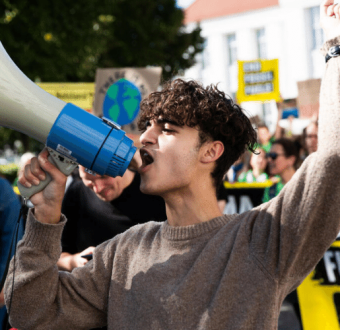At today’s Faith & Freedom Coalition event, “The Road to Majority,” Greenpeace asked presidential candidates about their reactions to Pope Francis’ call for solutions to climate change, as justified by science, faith and morality in his freshly-released encyclical on ecology, climate change and poverty.
As published by The Undercurrent, Former Florida Governor Jeb Bush surprised us. After being asked if he’d follow the lead of his father, President George H. W. Bush, on climate change, responding: “I embrace the reduction of carbon emissions that have taken place.”
As for the Pope’s strong call for moral action on climate change, Bush appears more likely to follow his own father than the Holy Father: “He has every right to have a view on it,” said Bush of Pope Francis.
In his speech at the Road to Majority event, Jeb Bush proclaimed that because of his faith, “we also put the most vulnerable in our society at the front of the line.” This would seem to uphold Pope Francis’ encyclical, though Bush himself made no such connection. The encyclical states “Many of the poor live in areas particularly affected by phenomena related to [global] warming.”
Former Pennsylvania Senator Rick Santorum initially brushed Greenpeace aside, as the entire conference was asked to evacuate the auditorium due to a bomb threat, though security and attendees did not appear too concerned. Neither did Mr. Santorum – he stopped his evacuation about 15 feet after not answering a question about the Pope and climate change.
When re-approached, Santorum decided not to answer any of Greenpeace’s questions, at least not directly. Watching the footage, it appears Mr. Santorum has no plan on climate change and no intention to honor the call of Pope Francis for leaders to contribute to climate solutions, despite being Catholic.
Louisiana Governor Bobby Jindal was less clear after apparently fielding a similar question before being approached by Greenpeace. He was asked about his climate position in comparison to the Pope’s, which he declined to elaborate on.
When pressed on the effects of climate change on coastal Louisiana, which scientists warn could be devastating to cities like New Orleans. Gov. Jindal ignored the climate component and simply said he’s investing in coastal restoration. This is an irrelevant point, since coastal restoration does nothing to prevent rising seas and warmer waters caused by climate change, which can amplify the damage that inevitable future hurricanes deal to Jindal’s constituents.
Greenpeace wasn’t the only group interested in how the Pope’s leadership on climate change and poverty is impacting politicians. The Undercurrent’s Lauren Windsor published interactions with Jeb Bush, Senator Ron Johnson (R-WI) and Representative Steve King (R-IA), who was questioned by James Salt of Catholics United. Mr. Salt was present at a press conference the previous day, put on by the Franciscan Action Network, featuring speakers from Green Muslims and the Religious Action Center for Reformed Judaism calling for cooperation on climate change solutions.
Unlike the Catholic Republican Presidential contenders, Pope Francis’ new teaching document for Catholic Priests, Bishops and Cardinals speaks very clearly:
Climate change is a global problem with grave implications: environmental, social, economic, political and for the distribution of goods. It represents one of the principal challenges facing humanity in our day. Its worst impact will probably be felt by developing countries in coming decades. Many of the poor live in areas particularly affected by phenomena related to warming, and their means of subsistence are largely dependent on natural reserves and ecosystemic services such as agriculture, fishing and forestry. They have no other financial activities or resources which can enable them to adapt to climate change or to face natural disasters, and their access to social services and protection is very limited. For example, changes in climate, to which animals and plants cannot adapt, lead them to migrate; this in turn affects the livelihood of the poor, who are then forced to leave their homes, with great uncertainty for their future and that of their children. There has been a tragic rise in the number of migrants seeking to flee from the growing poverty caused by environmental degradation. They are not recognized by international conventions as refugees; they bear the loss of the lives they have left behind, without enjoying any legal protection whatsoever. Sadly, there is widespread indifference to such suffering, which is even now taking place throughout our world. Our lack of response to these tragedies involving our brothers and sisters points to the loss of that sense of responsibility for our fellow men and women upon which all civil society is founded.



